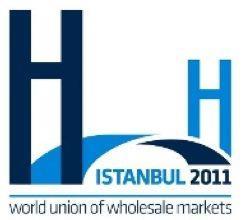
Gathering under the theme of ‘Globalising Wholesale Markets: Encouraging supply and demand between the East and West’, delegates at the recent World Union of Wholesale Markets (WUWM) annual congress could hardly have been better placed than in Istanbul – a city itself split by the border between Europe and Asia. A stroll along any main road in the city quickly reveals it is struggling to cope with traffic congestion – a thorn in the side of any wholesale network – but plans for a new 240,000m2 wholesale centre in Tuzla, adding to Atasehir market on the Asian side of the Bosphorus and Bayrampasa on the European side, should be welcome news for market operators attempting to feed the city’s 13m people. The city is targeting wholesale revenues of €45.1m this year, up from €32m last year and €26.8m in 2009.
Hamburg Wholesale Market’s Torsten Berens raised a key point during the congress in highlighting the importance of a food culture in dictating the size and structure of associated wholesale centres. 'It is very important to have food at the centre of a culture. We go to schools and companies to tell them how vital it is to have local, healthy food available to them.' In certain European markets, where these priorities have slipped down the agenda in favour of price, there is not the capacity for huge sprawling markets serving both independent and large-scale retailers and a plethora of street markets. But, as Jan Lloyd, chief executive of London-based cgma pointed out, the avenues offered by foodservice – at least for markets in the UK capital – have proved a salvation for a trade undermined by the growth of large-scale retailers.
Elsewhere, two main themes emerged: safe food and logistics. On the first point, Selman Ayaz of the Turkish ministry of agriculture’s directorate of protection and control said the ministry’s decision to consider making market inspection results public would be a valuable tool. “You might just kill a brand if you present negative results to the public. Our purpose is to provide safe food and that’s our priority.” In terms of logistics, meanwhile, there was a palpable sense of intrigue running through the room as Marc Spielrein, chairman and ceo of Rungis International Market in Paris, provided details of the centre’s newly established railfreight development. Twice-nightly deliveries at 140kmh from Perpignan shift 1,100 tonnes per delivery via 24 refrigerated containers arriving at 2.30am and 4.30am. Despite problems with the quality of service from the French rail network – described by some as “patchy” – and the fact that the project relied heavily on considerable public funding, the savings being made in terms of energy, fuel and traffic reduction have greatly benefited the market. Spielrein’s assertion that the project is a long-term reaction to plans for high-speed links from Spain into northern Europe will interest those in northern Europe who may stand to benefit from the controversial high-speed rail project.
The international wholesale scene appears almost to be running along a set timeline. The UK and western Europe may prove to be an example of how things could develop with supermarket domination dictating the shape of diminishing markets. Whether this trend will continue worldwide, remains to be seen. Whatever happens, the increased number of Asian market delegates attending this year’s annual wuwm event would appear to suggest that market managers in emerging economies feel there is plenty to learn from those operating in more developed wholesale environments.






No comments yet